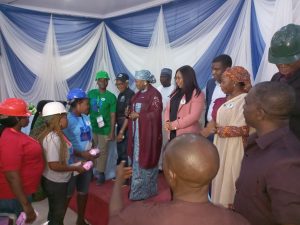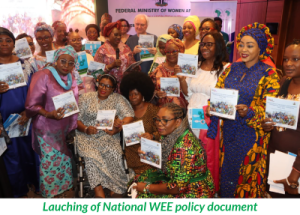The dRPC’s core values of inclusion and concern for beneficiaries positions the organization as a primary advocate and technical service provider for women and youth concerns. Given that gender is a cross cutting issue, the dRPC factors in women and girls into all its programming areas. We have developed gender analysis tools and approaches applicable to the design, monitoring and evaluation of all interventions. The dRPC works to develop innovative intervention designs in which the concerns and interests’ women and girls are incorporated as beneficiaries.
Since its formation in 1994, youth has been an important demographic for the dRPC. Recognized as an underserved, under-represented and marginalized constituency, the dRPC’s strategy has consistently been to support youth through a youth empowerment program implemented through three programming streams – 1) capacity building for youth professional and civil society associations; 2) leadership development, career guidance and training opportunities for youth; 3) expanding economic empowerment opportunities for youth through skills acquisition curriculum development, training and facilitation micro-funds for outstanding youth leaders. Some of our milestone youth empowerment programs have been:
1. Sub-grant and support for Society for Adolescent and young people’s health in Nigeria, (SAYPHIN) to convene and host award ceremony for young researchers working on youth solutions to public health and public policy issues: https://www.africannewspage.net/2019/04/promoted-day-drpc-awarded-prizes-certificates-to-its-health-for-development-research-fellows/
https://www.premiumtimesng.com/news/more-news/325899-plagiarism-a-major-flaw-in-research-expert.html
2. Capacity building support, scholarships and training for the Young Professionals in Public Health a subsidiary of West African Institute of Public Health, (the “waiph’s ypph”), 2019-2022
3. Sub-grant, capacity development by engaging a legal firm for registration, and training of for the management team of the Nigeria SDG network – https://nigerianyouthsdgs.org/webinar-report-opportunities-for-young-people-in-the-face-of-covid19-pandemic/.
dRPC – Leading women economic empowerment policy advocacy in Nigeria
The dRPC- Building capacity for WEE in Nigeria
While there has been a lot of buzz around women economic empowerment in Nigeria, most WEE proponents are beneficiary facing, training, funding and upskilling women to do business better. For the WEE interventions that are government facing, the main focus is on tracking women’s access to finical products and services and to also document what has been working in reaching women.
There are almost no interventions specifically dedicated to strengthening the capacity of women’s groups and economic collectives to advocate, in their own voice to public authority for the policies, programs, project, financing and regulatory frameworks which enable and promote women as valued economic actors in the development space.
This is the space that the development Research and Projects (dRPC) fills. We are local CSO capacity strengthening outfit with models, manuals and motivation to position women’s livelihood and economic groups to hone their collective voices, pool together evidence informed advocacy messages, target influentials and deliver demands with commitment and intent.
The dRPC – Strengthening capacity for WEE advocacy
Since 2021 the dRPC has consolidated its leadership in the women’s economic empowerment space at national and sub-national levels in Nigeria. We have strengthened the capacity of more than 60 women’s economic collectives and single NGOs; we have supported them to mine data; to identify exclusion in economic policies and instruments; to demand for inclusion; to follow up; track and complete the circle of evidence informed policy advocacy.
Our big wins
In our WEE work, the dRPC has achieved big wins in multiple spheres –
- At policy level we have contributed to the passage of the national WEE policy.
- In the media space we support the Association of Communication Scholars & Professionals of Nigeria (ACSPN) to train journalists on reporting WEE and to develop a post-graduate course for approval by the NUC.
- The dRPC is also collaborating with the Micheal Imoudu National Institute for Labour Studies (MINLS), training its management team to design and roll out programs to formalize women’s informal businesses across Nigeria.
- The MINLS collaboration has resulted in over 78 women’s cooperatives being trained and supported to formalize its businesses through registration, compliance and certification to access finance.
- At the sub-national level the dRPC has worked with women’s collectives in Plateau, Bauchi, Kano, Lagos, Sokoto and Aka Ibom states to track WEE lines in national budgets and advocate for increased allocation and cash backing.
- For three consecutive years, the dRPC has supported the National Center for Women in Development to mainstream advocacy components into the training program for young women in the urban space being taught non-traditional trades such as masonry and plumbing.
- The dRPC leads the way in positioning 3 of Nigeria’s leading women’s economic collectives:- the Association of Women In Agriculture (AWITA), National Association of Women Entrepreneurs (NAWE), and NACCIMA Women Business Group (NAWORG), for representation in national government platforms where they participated in high level WEE related activities such as the Central Bank of Nigeria (CBN) launching of themaiden Summit on Non-Oil Exports under the Race to $200 billion in Foreign Exchange (FX) Repatriation (RT200) program, February 2022.
- We are supporting 3 state governments to domesticate the national WEE policy
- The dRPC has raised salience and build visibility for WEE in policy spaces in Nigeria




